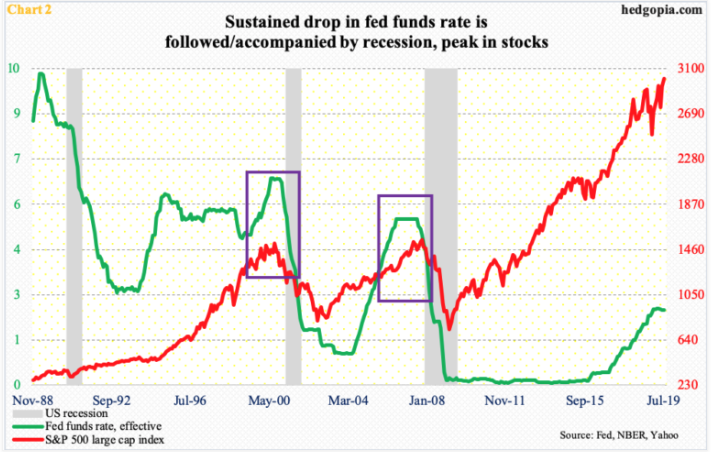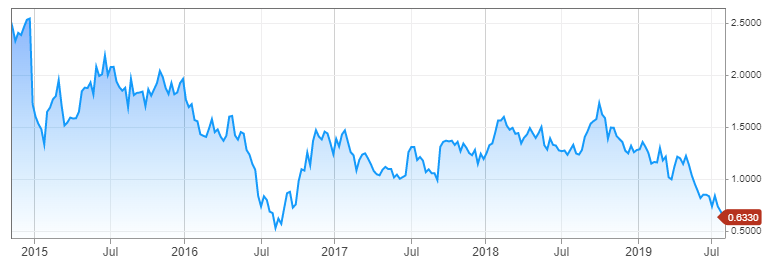by GoldCore
The Federal Reserve dropped interest rates by 0.25% and the U.S. stock markets fell from all time record new highs.
They also signaled to a surprised market that this is by no means an ongoing trend. The markets had to do a double take and were not enamored.

The Fed has turned dovish from a hawkish stance in just 6 months. They are rightly being mocked by some as now being in the pocket of Wall Street and the market which demands more and more accommodation to justify very lofty valuations.
This would be comical if it were not so serious. Our global markets are now addicted to official intervention and currency debasement to justify their ongoing flows and capital valuations.
This is happening 10 years after the emergency that was justified for adopting such extreme monetary measures began. They have become dumb and dumber with every accommodation, more demanding, more bold, and akin to a toddler having a tantrum.
Alas, every accommodation merely delays the inevitable correction, which threatens, with the passing of time, to become more systematically destructive. The time bought by cleansing the world’s financial balance sheets in 2009, by injecting liquidity, was not used to rebuild and restart the financial and monetary system.
Rather, it was used to bid up asset prices benefiting the chosen few.
The underlying structural issues are even more severe, risks more concentrated and the potential for lasting and permanent damage is very troubling.
No doubt the Fed see early warning signs that economic conditions are worsening and they feel they need to get ahead of the problem before it gets ahead of them.
Super Mario Draghi is signalling a “worse and worse” downturn in economic conditions. The US stock market has surged for 10 years now, posting a 4 fold increase.
In an excellent piece of research, Paban Raj Pandey explains that when the FED cuts, a recession follows (see chart above). The question is now does the cut trigger the recession with the public contracting spending or does the cut create exuberance by pumping the economy up to the point of derision and farce. It looks like the addict is now dictating to the dealer the price they are willing to pay.
ECB bond buying is in the dock in Germany by a number of patriotic and well informed members of the public. They are taking issue with the idea that the ECB can print euros and buy government bonds – known as monetary financing by officialdom or currency confiscation and theft by others.
It is illegal and rightfully so. The ECB’s defense is as idiotic as the original policy; they do not buy the bonds off the governments directly, rather they buy them off brokers who buy them off governments.
Here is the rub, if a central bank, mandated to control inflation, targeting 2% in most cases and keeping unemployment low can also then buy bonds issued by governments – we, collectively, become blinded to risks building in said economy.
Why, because the bond market is the largest capital market in the world. It is a de-facto measure of risk expectations now and into the future. If it does not like something, there tends to be good reason, because there is something not to like or some growing risk that needs to be considered and addressed.
If the price of a bond goes up and approaches par, then the yield is falling. This indicates that the market is happy with the risk in the world represented by that bond. Conversely if the bond falls out of favour, the price it commands falls and the yield rises, far above the initial interest rate coupon.
If country starts down a very risky and precarious path that has lots of risks you would expect that bond yields would rise. This shunning of the bonds by the market, would show up those in charge, cause strain in the public finances and force budgetary changes, thus raising the stakes for the government. Those in power would feel the heat, be removed or change course. The bond market is a sophisticated estimation of risk as voted by investors who have skin in the game. Central bankers do not have skin in the game.
We would argue that Brexit would have been debated more comprehensively and more rigorously from the initial announcement and that debate would have been reflected in a free bond market pricing in risk.
But because the world’s central banks are so active in our bond markets they have tempered debate, quashed decent and prudent policies and have led to political leaders who are wholly untested to govern nations.

Brexit may be the best long term, trajectory for the UK or it may not. But denying the collective wisdom of a free market is very, very dangerous.
Buying gold in this market gives personal sovereignty to investors and savers. It makes them less dependent on governments, banks and central banks. Why because gold and silver cannot be printed and electronically created at will and are universally liquid and exchangeable and proven stores of value.